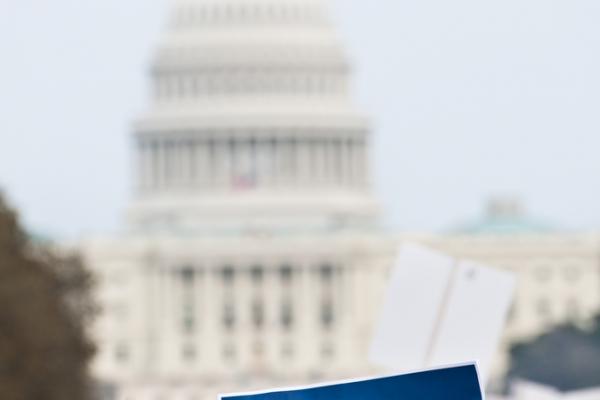In a recent USA Today article, reporter Alan Gomez highlights the broad support for immigration reform including among the evangelical faith community.
“About 300 conservatives from around the country and with varying backgrounds — pastors, farmers, police chiefs, business owners — will arrive in Washington on Oct. 28 to meet with Republican lawmakers and make a conservative pitch for a new immigration law,” he wrote.
While Gomez’s piece effectively captures the strong support for immigration reform among evangelical leaders, among others, it also quotes Roy Beck, executive director of the population-control group NumbersUSA, who says these leaders “don’t represent the evangelical rank and file.”
Polls and recent grassroots activity show otherwise.
"Foster care touches on multiple issues and engaging the system is a way to comprehensively engage some of the biggest challenges to a city’s flourishing."
There is a new initiative in Washington, D.C. that hopes to so profoundly change the foster care system in the city that the supply of foster homes will far exceed the demand for them. DC127 is an organization committed to “reversing the list” of children and youth who are waiting for a foster or adoptive home. By reminding churches of the biblical mandate to care for widows and orphans, they have started a network in D.C. that spans Christian denominational lines.
The movement is beginning to gain some traction and DC127 is gearing up for its first event on November 2.
The Oneida Indian Nation’s campaign against the Washington pro football club’s team name picked up new supporters this week when more than two dozen clergy in the Washington region committed to taking the fight to their pulpits.
“Black clergy have been the conscience of America,” Oneida Nation representative Ray Halbritter said to a gathering of roughly 40 people on folding chairs in the basement of Plymouth Congregational United Church of Christ. “This is not a fight we could do by ourselves, or should do by ourselves.”
The Rev. Graylan Hagler, senior minister at Plymouth, asked for a show of hands Wednesday to indicate which clergy members in attendance would be willing to preach against what he termed the “R word.” More than a dozen raised their hands. Hagler said that a different dozen committed to the cause at a clergy breakfast meeting Wednesday and that, all told, he has commitments from roughly 100 clergy members to talk to their congregations in coming weeks.
A coalition of 125 religious, civil rights, and community-based organizations sent a letter to the U.S. Department of Justice Thursday urging a civil rights investigation into a New York City Police Department program that spies on Muslims.
Groups from several faith traditions signed the letter including the Presbyterian Church (USA), the National Council of Jewish Women, the Hindu American Foundation, and the Sikh Coalition. Civil rights groups include the Leadership Conference on Civil and Human Rights, the NAACP, the American Civil Liberties Union, South Asian Americans Leading Together, and the National Network for Arab American Communities.
The NYPD program is already the target of two federal lawsuits, one filed in June by the ACLU and the City University of New York Law School’s Center for Law Enforcement Accountability and Responsibility, and the other filed in June 2012, by several Muslim plaintiffs represented by Muslim Advocates and the law firm Bhalla and Cho.
The election of Pope Francis in March heralded a season of surprises for the Catholic Church, but perhaps none so unexpected – and unsettling for conservatives – as the re-emergence of the late Chicago Cardinal Joseph Bernardin as a model for the American Catholic future.
While there is no indication that Francis knows the writings of Bernardin, who died in 1996, many say the pope’s remarks repeatedly evoke Bernardin’s signature teachings on the “consistent ethic of life” – the view that church doctrine champions the poor and vulnerable from womb to tomb – and on finding “common ground” to heal divisions in the church.
I first heard about the Strange Fire controversy when my Twitter feed started tweeting up a storm on Monday. The drama centered on a confrontation between two conservative mega church pastors, John MacArthur and Mark Driscoll. Most of my Twitter friends are theological liberals, and we liberals love it when our conservative brethren get in fights.
Woo-hoo! A scandal!
This scandal, like most scandals, was overblown. Driscoll says that MacArthur and his people were “gracious that they let me on campus at all.” What was Driscoll doing “on campus?” He crashed MacArthur’s conference on the Holy Spirit called Strange Fire to meet with people and hand out free copies of his upcoming book, A Call to Resurgence, which has a chapter on the Holy Spirit. Conference officials told Driscoll he had to stop, and so he did. Driscoll’s books ended up in the hands of conference officials. The drama between the two has to do with whether Driscoll gave the books as a gift to the conference or if conference officials confiscated them.
Like all scandals, the drama distracts us from what really matters, which is the conference theme. The work of the Holy Spirit is vitally important for Christians, yet the Holy Spirit is usually treated like the ugly stepchild of Christian doctrine. (No offense to ugly stepchildren.) I think MacArthur radically misunderstands the Holy Spirit. The conference website provides an overview of its mission, which will help me explain his misunderstanding:
WASHINGTON — Collection plates are growing even lighter as Protestant church member giving reached new lows in 2011, and tithing probably will not recover from the recession, according to a new report by Empty Tomb, a Christian research group.
“Is the issue that the church is not providing an authentic alternative to the consumer mindset?” said Sylvia Ronsvalle, executive vice president of Empty Tomb. “Over a period of time, if the church isn’t providing more of an authentic alternative, the church will lose.”
The percentage of a church member’s income given to the church dropped to 2.3 percent in 2011 (the latest year for which numbers are available), down from 2.4 percent in 2010, according to the Empty Tomb study.
American Jews say they face discrimination in the U.S., but they see Muslims, gays, and blacks facing far more.
This and other findings from the recently released Pew Research Center’s landmark study on Jewish Americans help make the case that Jews — once unwelcome in many a neighborhood, universitym, and golf club — now find themselves an accepted minority.
“While there are still issues, American Jews live in a country where they feel they are full citizens,” said Kenneth Jacobson, deputy national director of the Anti-Defamation League, which was founded in 1913 to combat anti-Semitism.







